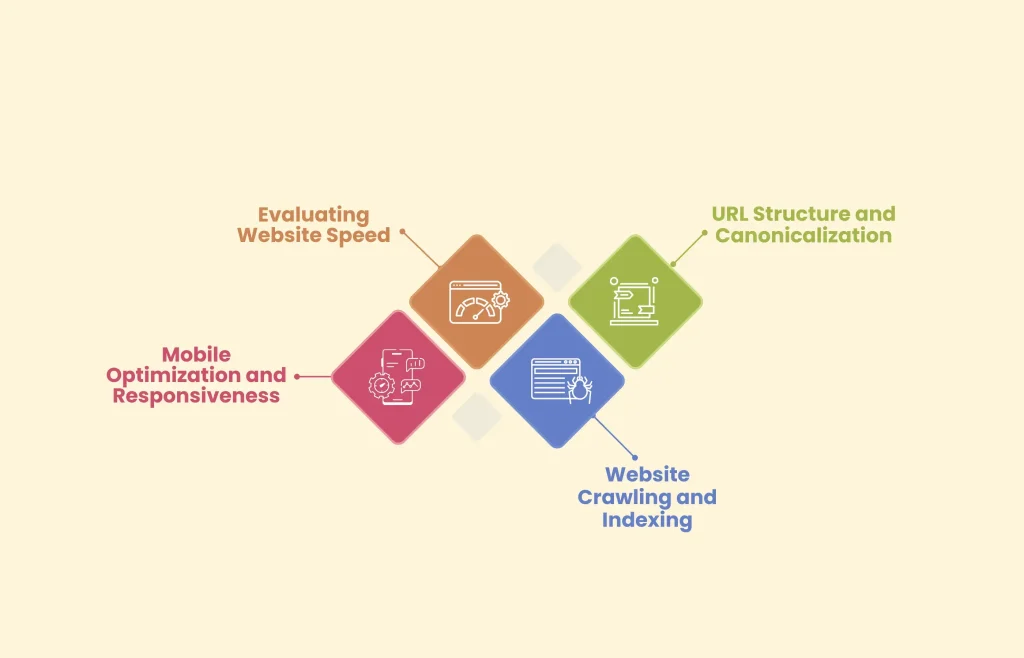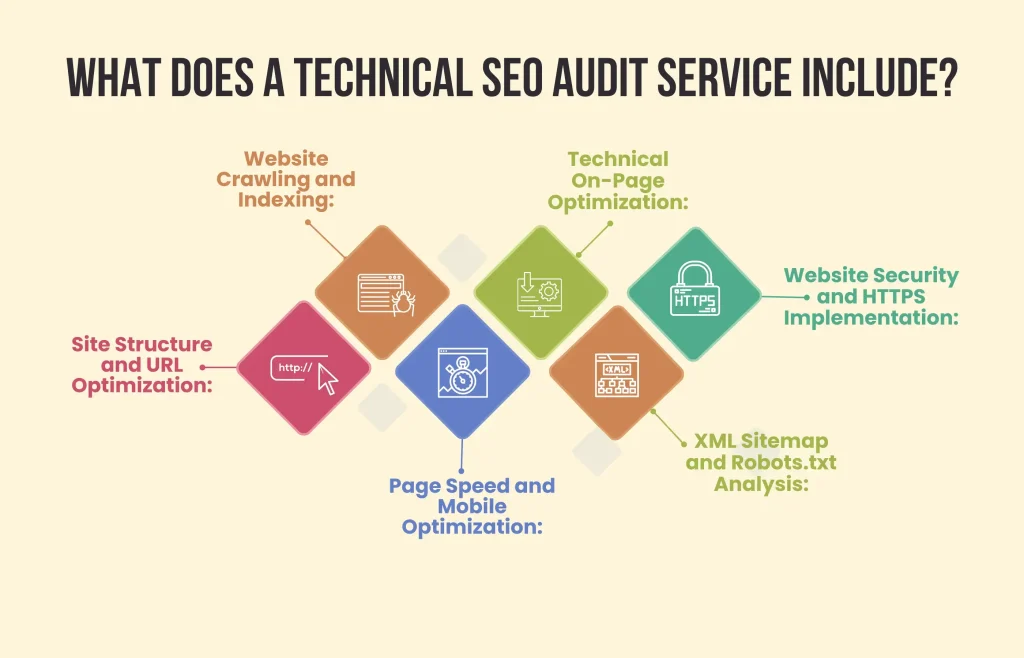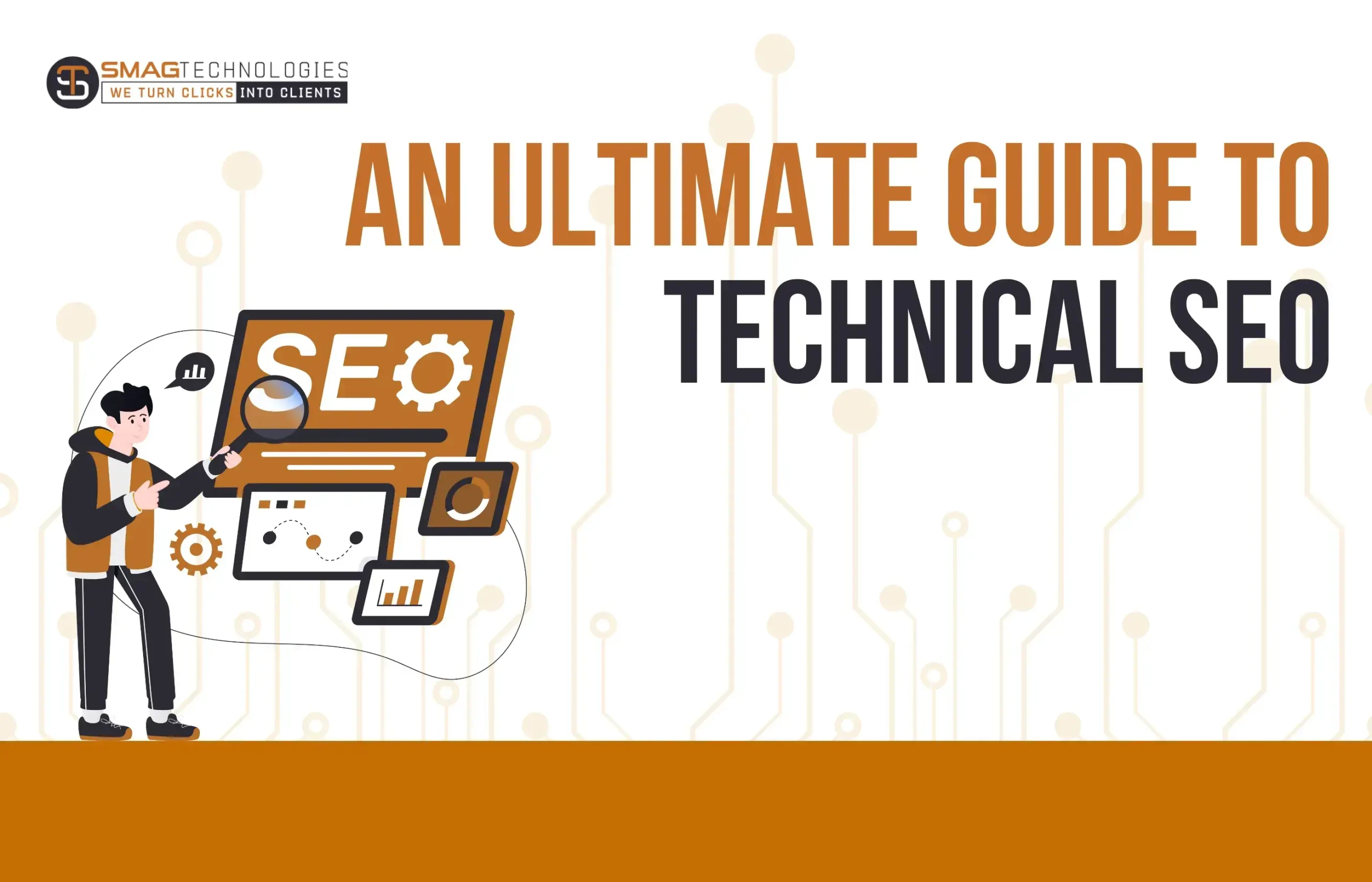In the world of digital marketing, technical SEO plays a crucial role in optimizing websites for search engines. It focuses on the backend elements of a website that contribute to its visibility and performance in search engine results pages (SERPs). By implementing technical SEO best practices, you can enhance your website’s crawling, indexing, and overall search engine friendliness.
What is Technical SEO?
Technical SEO refers to the optimization of a website’s technical aspects to improve its search engine visibility. It involves fine-tuning elements like website speed, mobile responsiveness, URL structure, internal linking, structured data markup, security, and more. The goal is to create a website that search engines can easily crawl, understand, and index, ultimately leading to higher rankings and increased organic traffic.
Importance of Technical SEO in Search Engine Optimization
Technical SEO forms the foundation of any successful SEO strategy. It ensures that your website meets search engine guidelines and provides a seamless user experience. By optimizing the technical aspects, you can improve your website’s visibility, and indexability, thereby boosting its chances of ranking higher in search results. Additionally, a technically sound website enhances user satisfaction, leading to increased engagement, conversions, and ultimately, business growth.
Technical SEO Checklist
Here’s a Technical SEO Checklist:

Evaluating Website Speed
Website speed is a critical factor in user experience and SEO. Slow-loading websites frustrate users and lead to higher bounce rates. To assess your website’s speed, use tools like Google PageSpeed Insights or GTmetrix. These tools provide insights into your website’s performance and suggestions for improvement.
Mobile Optimization and Responsiveness
With the majority of internet users accessing websites through mobile devices, mobile optimization is paramount. Responsive web design ensures that your website adapts to different screen sizes and provides a seamless user experience across devices. This improves user engagement and reduces bounce rates.
Website Crawling and Indexing
Search engine crawlers, also known as bots or spiders, are automated programs that systematically scan and analyze web pages. They discover and collect information from websites, which are then indexed and ranked in search engine databases. Understanding how crawlers work can help you optimize your website for better indexing and visibility.
URL Structure and Canonicalization
SEO-friendly URLs are concise, descriptive, and easy for both users and search engines to understand. Consider the following tips when creating URLs:
- Incorporate targeted keywords in your URLs to give search engines a clear idea of the page’s content.
- Separate words in the URL with hyphens for better readability.
- Aim for shorter URLs that are easier to remember and share.
Structured Data Markup
Structured data markup provides search engines with additional context about your website’s content. It uses standardized formats (such as Schema.org) to categorize and label different elements on your web pages. This helps search engines understand your content better and display rich snippets in search results
HTTPS and Website Security
HTTPS (Hypertext Transfer Protocol Secure) is the secure version of HTTP, and it encrypts the data transmitted between a user’s browser and the website. HTTPS is crucial for SEO because:
- HTTPS enhances website security and protects user data, fostering trust among visitors.
- Search engines prioritize secure websites, and HTTPS is a ranking factor.
XML Sitemaps and Robots.txt Optimization
XML sitemaps serve as a roadmap for search engine crawlers, helping them discover and understand the structure of your website. To create and optimize XML sitemaps:
- Ensure your XML sitemap includes all significant pages on your website.
- Use the <priority> and <changefreq> tags to indicate the relative importance and update frequency of each URL.
- Use Google Search Console and other search engine webmaster tools to submit your XML sitemap for indexing.
Content SEO vs Technical SEO
Content SEO vs technical SEO are two crucial components of a comprehensive SEO strategy. While they are distinct areas of focus, they work together to improve a website’s visibility and rankings in search engine results. Let’s explore the differences and importance of each:
Content SEO: Optimizing for Relevance and Value
Content SEO revolves around creating high-quality, relevant, and valuable content that aligns with users’ search intent. The goal is to provide informative and engaging content that satisfies user queries and encourages them to stay on your website. Content SEO involves keyword research, content creation, and on-page optimization.
Keyword Research: Identifying User Intent
Keyword research is a fundamental aspect of content SEO. It involves identifying the keywords and phrases that users are searching for about your products, services, or industry. Tools like Google Keyword Planner, SEMrush, and Ahrefs can help you discover relevant keywords with high search volume and low competition.
Content Creation: Engaging and Informative Content
Once you have identified your target keywords, create content that provides value to your audience. Focus on developing comprehensive, well-researched, and engaging articles, blog posts, videos, or other forms of content. Incorporate the target keywords naturally throughout the range, ensuring a balance between optimization and readability.
On-Page Optimization: Metadata and Structured Content
On-page optimization involves optimizing various elements within your content to make it more search engine-friendly. This includes optimizing title tags, meta descriptions, headers, and URL structures. Additionally, ensure your content is well-structured with proper headings, subheadings, and formatting for easy readability.
Technical SEO: Enhancing Website Structure and Performance
Technical SEO, on the other hand, focuses on the backend aspects of a website that affect its crawling, indexing, and overall performance. It involves optimizing technical elements to make your website more accessible, efficient, and search engine-friendly.
Website Speed and Performance Optimization
Technical SEO addresses factors like website speed, mobile responsiveness, caching, and server response time. Optimizing these aspects ensures that your website loads quickly, providing a seamless user experience. Search engines prioritize fast-loading websites, so optimizing your website’s performance is crucial for both user satisfaction and SEO.
Indexing and Crawling Efficiency
Technical SEO ensures that search engine bots can easily crawl and index your website’s pages. This includes optimizing your XML sitemaps, implementing proper robots.txt directives, and managing URL parameters effectively. By providing clear instructions to search engine crawlers, you help them discover and understand your content better.
Structured Data Markup
Structured data markup, a technical SEO element, involves adding additional information to your content using structured data formats like Schema.org. By implementing structured data markup, you help search engines understand the context and meaning of your content. This can enhance your website’s visibility and enable rich snippets in search results.
The Synergy of Content SEO VS Technical SEO
Content SEO vs technical SEO are not mutually exclusive but interconnected. While content SEO focuses on creating valuable and relevant content, technical SEO ensures that this content is accessible, crawlable, and indexable by search engines. Here are a few examples of how these two aspects of SEO work together:
Keyword Optimization:
Content SEO researches and targets relevant keywords, while technical SEO ensures those keywords are strategically placed within the website’s metadata, headings, and content.
Site Architecture:
Technical SEO establishes a logical site structure that facilitates content discovery and internal linking, supporting the user experience and content organization efforts of content SEO.
User Experience:
Content SEO creates engaging content, and technical SEO optimized website performance, ensuring fast loading times and a mobile-friendly design for an improved user experience.
Indexing and Ranking:
Content SEO aims to create high-quality content that appeals to users and search engines. Technical SEO ensures that search engines can easily crawl and index your content, helping it rank higher in search results.
Why Invest in a Technical SEO Audit Service?
A technical SEO audit service provides a comprehensive evaluation of your website’s technical infrastructure, highlighting areas that require attention and improvement. Here’s why investing in a this service is beneficial:
Identify Technical Issues:
A technical SEO audit uncovers issues that may hinder search engine crawlers from effectively indexing your website. These issues can include broken links, duplicate content, slow page load times, improper redirects, and more.
Improve Website Performance:
By identifying and addressing technical issues, a technical SEO audit helps improve your website’s overall performance, resulting in faster loading times, better user experience, and increased engagement.
Enhance Search Engine Visibility:
A thorough technical SEO audit ensures that your website follows best practices and adheres to search engine guidelines. By rectifying technical issues, you increase your chances of ranking higher in search engine results pages (SERPs) and attracting organic traffic.
Stay Competitive:
In the highly competitive online landscape, keeping up with the latest SEO trends and technical advancements is crucial. A technical SEO audit service helps you stay ahead of the competition by optimizing your website’s technical aspects for maximum visibility and performance.
What Does a Technical SEO Audit Service Include?
It involves a comprehensive evaluation of various technical aspects of your website. Here are some key components that may be included in a technical SEO audit:

Website Crawling and Indexing:
The audit analyzes how search engine crawlers access and index your website’s pages, identifying any crawl errors, indexing issues, or blocked content.
Site Structure and URL Optimization:
The audit assesses the organization and structure of your website, ensuring it is logical, user-friendly, and optimized for search engines. It includes analyzing URL structures, internal linking, and navigation menus.
Page Speed and Mobile Optimization:
The audit evaluates your website’s loading speed and mobile responsiveness, as these factors significantly impact user experience and search engine rankings. It identifies opportunities to improve page speed and mobile optimization.
Technical On-Page Optimization:
The audit examines on-page elements such as title tags, meta descriptions, headers, and schema markup. It ensures that these elements are optimized and aligned with your targeted keywords and search intent.
Website Security and HTTPS Implementation:
The audit assesses your website’s security measures, including the implementation of HTTPS encryption. It identifies any potential security vulnerabilities and recommends necessary security enhancements.
XML Sitemap and Robots.txt Analysis:
The audit reviews the XML sitemap and robots.txt files to ensure they are properly structured, optimized, and effectively communicate instructions to search engine crawlers.
SMAG Technologies - Your Trusted Technical SEO Company
When it comes to optimizing your website’s technical health and ensuring maximum search engine visibility, SMAG Technologies, a leading technical SEO agency, specializes in providing comprehensive technical SEO audit services. With our expertise and experience in the field, we have helped numerous businesses enhance their online presence and drive organic traffic through effective technical SEO strategies.
Our customized approach ensures that we thoroughly analyze and evaluate every aspect of your website’s technical infrastructure. From website crawling and indexing to site structure, page speed, and on-page optimization, we leave no stone unturned in identifying and rectifying any technical issues that may be hindering your SEO performance.
With SMAG Technologies as your service provider, you can expect comprehensive reporting that clearly outlines the identified issues, their impact on your website’s performance, and actionable recommendations for improvement.
But what sets SMAG Technologies apart from the rest is our unwavering commitment to delivering results. We understand the ever-changing landscape of SEO and stay up-to-date with the latest trends and best practices. By choosing SMAG Technologies, you are choosing a partner who will not only optimize your website’s technical aspects but also help you stay ahead of the competition and achieve long-term success in the digital realm.
Trust SMAG Technologies as your dedicated service provider, and let us unlock the full potential of your website through meticulous analysis, strategic optimization, and unwavering dedication to your success.
 seolounge
seolounge



